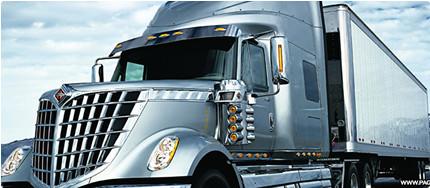New! High Road 2.0! We have a new version of this program. You can find it here: High Road 2.0
13.11 Logbook Tips And Tricks
The first several months of your driving career is tough. You're new, you second guess everything you do, you lack confidence, and you're not sure how to maximize every minute you have in order to make the most money you possibly can. This section will give you some tips and tricks to maximizing your hours. All of these tips will assume that you will be using an EOBR.
Plan Your Trip
While proper trip planning has always been important, it's even more important while driving with an EOBR. Let's face it, drivers weren't exactly honest driving with paper logs. If they didn't plan a trip correctly and couldn't make their pickup or delivery on time, the problem could be easily resolved by lying on the logbook. Not only is this practice illegal, but it's nearly impossible to do on electronic logs. Before you accept a load, you should plan out all of the details of your trip including the following:
- Know where you will fuel.
- Know where you will take your breaks.
- Plan your route and be sure you have the correct directions to each location you will be going to.
- Schedule an ETA for your arrival at your destination.
- If your trip will take longer than 1 day, plan out each day of your trip.
- Leave yourself some cushion room in case of a road closure, unexpected traffic, a weather event, etc.
- If you can make your trip safely and legally but you don't have a comfortable cushion time, inform your dispatcher about the situation before taking the load.
Check the weather
Part of planning ahead means checking the weather. Many times your trip will take you through several states and maybe even to the other side of the country. Plan ahead for any significant weather you may encounter. Don't let a snowstorm or any other significant weather event catch you off guard. Plan for it early to reduce the chances of any surprises later.
Keep your fleet manager informed
Many drivers do not keep their fleet manager (dispatcher) informed of situations which arise. For example, if a driver experiences a flat tire, he may not inform his fleet manager since this is normally a quick fix. But what if that same driver then hits a road closure, then a snowstorm, and then an unexpected traffic backup? If the driver had kept his dispatcher informed of each delay, it wouldn't be a shocking surprise when he informs his fleet manager that the trip can no longer be made on-time. Many unexpected delays happen in trucking. Make sure your fleet manager is aware of any issues, or even potential issues, well ahead of time.
Have A Backup Plan
In the trucking industry, the only thing that remains constant is constant inconsistency! While you should always plan out your trip, you also need to plan for the inevitable delay that you will encounter. If your trip progresses without delay, great! But what if you estimate that the truck stop you'll park at is 10 hours away, only to hit a road closure that delays you for 3 hours? You will no longer be able to make your originally planned stop. So what do you do now? Where will you park? Can you still make your delivery on time? You should always create backup plans as a part of your regular trip planning.
Call Ahead
If you are picking up or delivering a load and have some time to spare on either the pick up or delivery times, call ahead and see if you can arrive early. This is an excellent way to ensure you complete the load quickly and become available for the next one. Customers are used to getting phone calls from truck drivers. Don't be afraid to call ahead.
Always use overnight parking

While using EOBRs , overnight parking at customer facilities are huge time savers. Most EOBRs will automatically switch you to the drive line if you travel any more than about 2 miles. That means, even if you park at a truck stop just 5 miles away from your receiver, then drive to the receiver in the morning for your delivery, you will have started your 14-hour duty clock. The entire time your truck is being unloaded will be eating away at your 14-hour duty clock. That's a whole lot of wasted time!
Instead, call ahead and find out if you can park on property until your pick up / delivery time. Even if they don't allow overnight parking, they may be able to tell you somewhere else close by to park at, such as a side street or vacant parking lot. This will help to ensure that you remain off-duty the entire time your truck is being unloaded (provided you aren't the one unloading the truck, in which case you must log the time as on-duty). Once you're unloaded, you'll have your full 14-hour duty clock and your full 11-hours of driving available for the next load assignment you receive. Over a period of time, this will effect your paychecks and the number of miles you run in a very big way.
Many companies will let you know where to fuel when you receive your load assignment. Make sure you know where those fuel stops are and plan for those stops.
The best way to avoid getting lost is to use all technology to your advantage while planning out your trip. You should always use a Truckers Atlas as your main form of navigation, but don't be afraid to also check GPS directions. You can also use Google Maps to zoom in on customer locations.
If it's an extended trip, make sure you have enough available hours on your 70-hour duty limit to fully complete the load assignment on time.
A happy dispatcher normally means happy drivers. But there's one thing dispatchers really don't like and that's a last minute emergency. If you are being delayed, your dispatcher can form a backup plan just in case. But if you wait until the last minute, your dispatcher will have to scramble. EOBRs leave little to no room for mistakes and delays. Always communicate potential problems with your dispatcher before it turns into an emergency.









 TT On Facebook
TT On Facebook